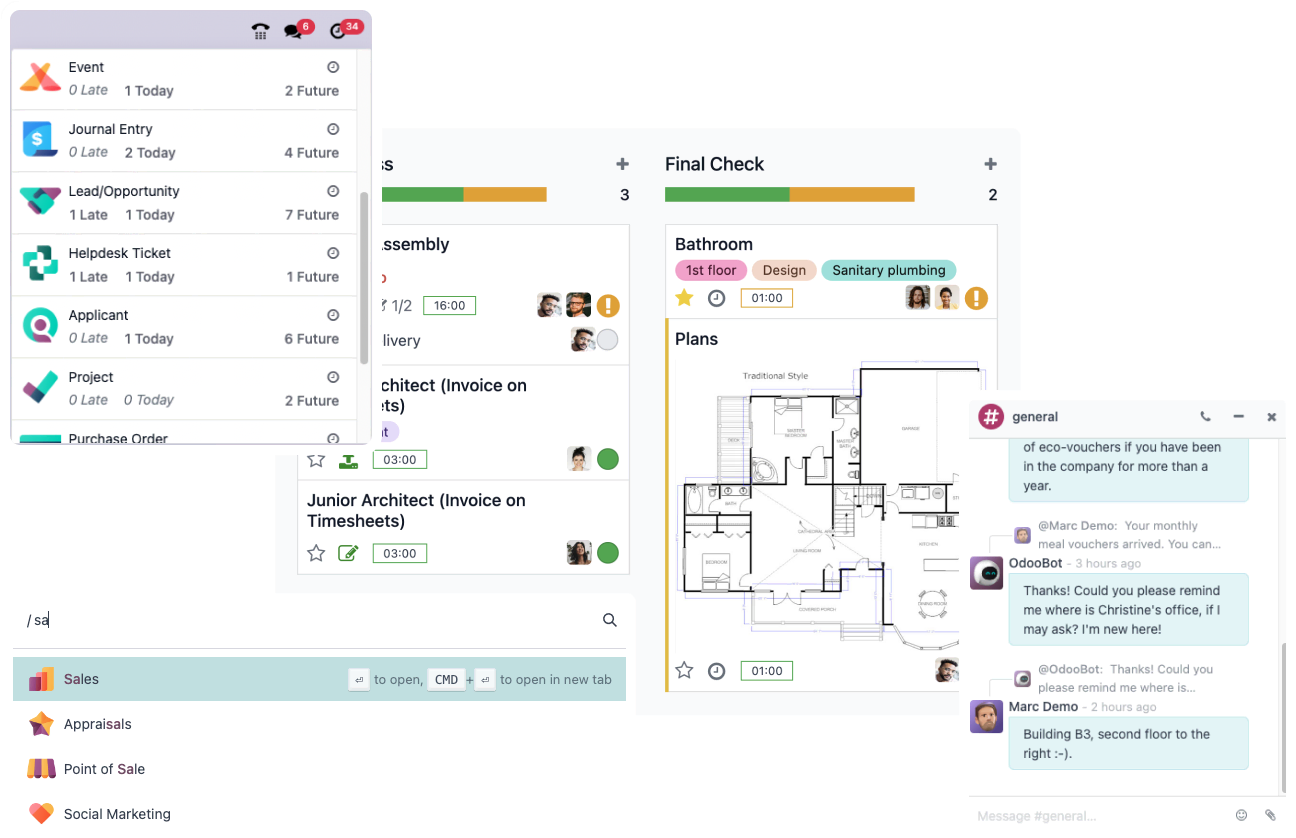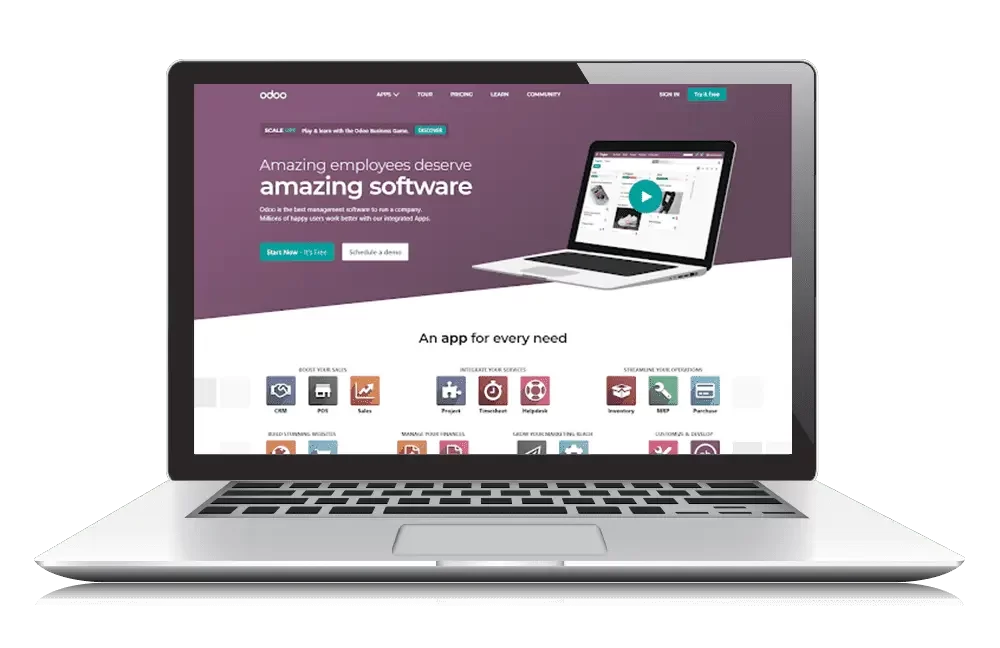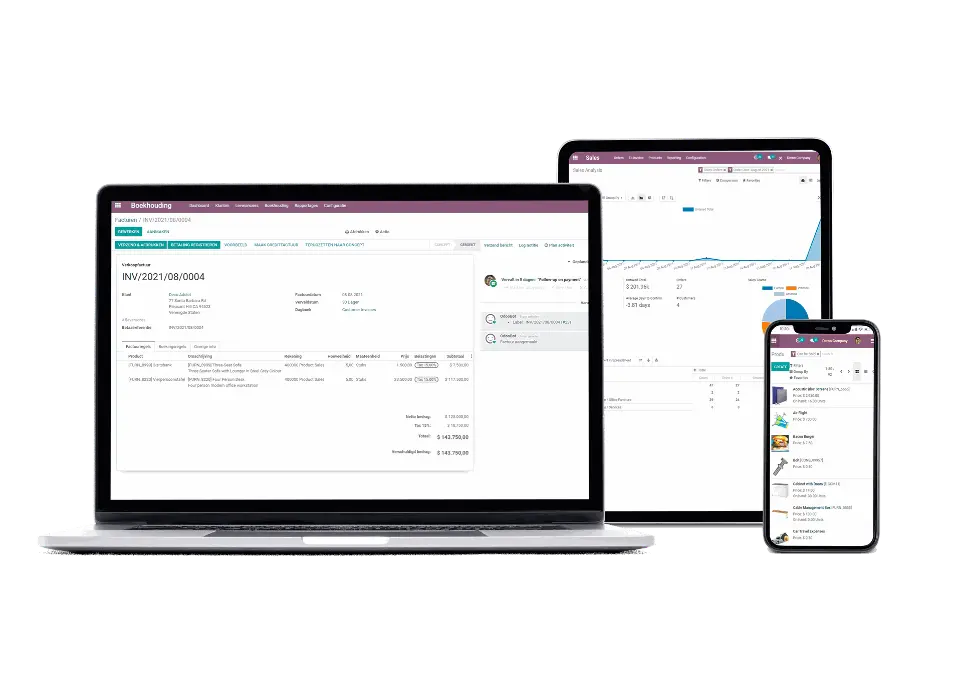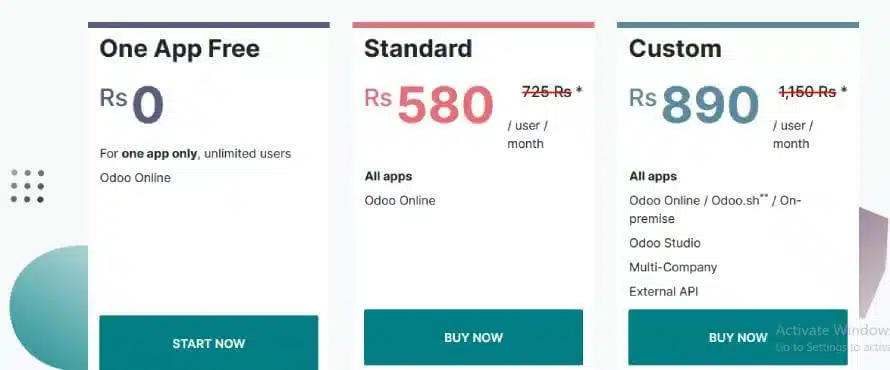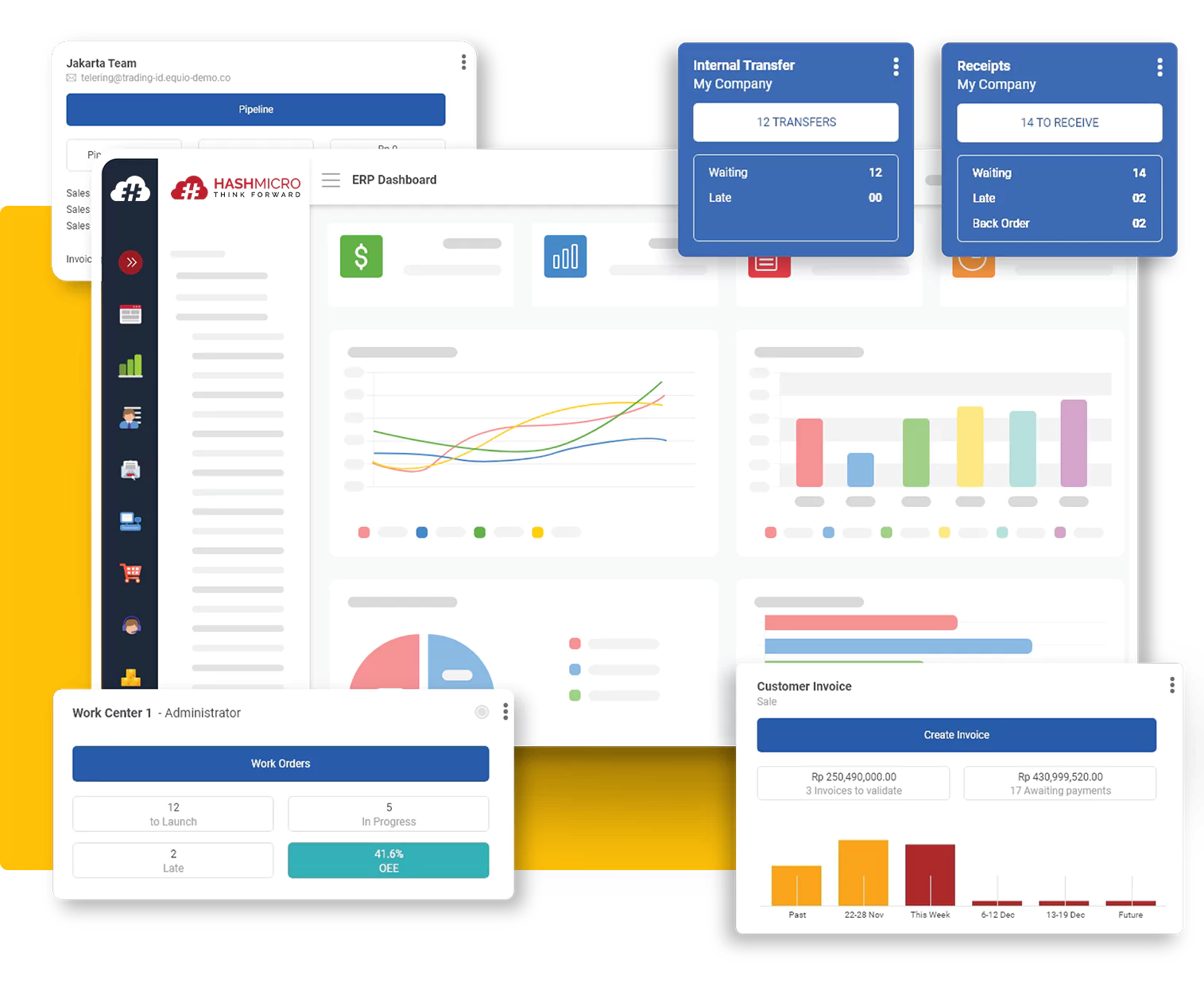Navigating various ERP (Enterprise Resource Planning) software options can be a daunting task, especially when considering the financial investment involved. Among the many solutions on the market, Odoo ERP stands out with its modular approach and customizable features.
However, understanding the pricing structure for implementation and licensing can be challenging, leaving many business leaders and IT managers wondering how to budget effectively for their ERP needs.
In this article, we will explore the comprehensive details of Odoo pricing and cost structure, offering valuable insights to help you make an informed decision tailored to your company’s specific needs and budget.
Key Takeaways
|
Table of Content:
Table of Content

A Brief Overview of Odoo ERP
Odoo ERP is a comprehensive ERP (Enterprise Resource Planning) software that stands out for its modular structure. This structure allows businesses to start with the basics and add additional modules as their needs evolve.
The software integrates various business functions into a centralized platform, streamlining processes and enhancing efficiency. With Odoo, businesses can improve data accessibility and accuracy, increase productivity through automation, and better manage company resources.
Odoo’s modules are designed to work independently yet integrate seamlessly with other modules, providing an efficient system that supports businesses’ growth and operational excellence. Here are some of the modules in Odoo Singapore:
- Sales Management
- Inventory Management
- Accounting
- Human Resources
- Customer Relationship Management (CRM)
- Point of Sale
- Manufacturing
- Project Management
Odoo Pricing Plans
Odoo ERP offers two distinct editions of its ERP system, each designed to cater to different business needs and scales. Understanding these options will help you choose the right plan that aligns with your business requirements and budget.
1. Community Edition
The Community Edition of Odoo is a free package that appeals to businesses looking for basic ERP functionalities without a significant investment. This open-source edition offers core sales, inventory, accounting, and customer relationship management (CRM) modules.
This edition also offers basic tools like an invoicing application suitable for straightforward accounting needs. Although this edition does not come with direct support from Odoo, users can tap into an active community forum and various online resources for help and guidance.
a. Licensing costs
The Community Edition is entirely free, eliminating any upfront licensing fees. This setup is particularly advantageous for businesses testing ERP systems or those with limited budgets, allowing them to leverage core ERP functionalities at no cost.
b. Hosting costs
You can choose between two hosting options:
- Self-hosting: Businesses opting for self-hosting must manage their own server infrastructure. You will incur costs related to hardware, network infrastructure, and data center expenses.
- Cloud hosting: Alternatively, you can opt for cloud ERP hosting, where you pay for server resources like CPU, RAM, and storage on a subscription basis. The costs here will vary depending on the resource usage.
c. Implementation and deployment costs
Odoo implementation pricing costs typically cover the expenses of employing consultants or using your team to install Odoo, set up its various modules, transfer existing data into the system, and ensure everything runs smoothly.
d. Customization costs
Basic customizations can be affordable, but more advanced changes or integrations can become costly. You should plan for these development expenses if you need specific features or additional functionality.
2. Enterprise Edition
Designed for businesses that need advanced features and more direct support, the Enterprise Edition of Odoo ERP builds on the foundation of the Community Edition by incorporating more sophisticated tools and functionalities.
The Enterprise Edition of Odoo ERP includes regular updates from Odoo to ensure that it remains on the cutting edge, offering new features and improvements to keep your business competitive and efficient.
a. Licensing costs
The Enterprise Edition offers more structured Odoo pricing plans:
- One App Free: One App Free is an introductory plan ideal for businesses that need just one application. It is free, though additional costs may apply if other apps are integrated.
- Standard: This plan suits businesses seeking a comprehensive ERP solution with access to all Odoo modules. It’s priced per user, providing predictability in costs and scaling as your business grows.
- Custom: For enterprises requiring a high degree of customization and integration, the Custom plan offers the most flexibility. Although it is the most expensive option, it caters to specific business needs that cannot be met by the Standard plan.
b. Hosting costs
The Enterprise Edition offers three different hosting options:
- On-premises: Odoo enterprise on-premise pricing involves hosting on a local or third-party server, granting complete control over the ERP environment. It comes with higher responsibilities for maintenance and operational management.
- Odoo Online: Odoo manages this hassle-free option, handling all operational and maintenance tasks. It offers a cloud experience, so users can focus on using the ERP without worrying about backend technicalities.
- Odoo.sh: This platform provides shared and dedicated server options to suit various business sizes and needs. Particularly beneficial for businesses with complex processes, Odoo.sh also extends cost advantages to Odoo partners.
c. Implementation and deployment costs
Based on Odoo review, Odoo implementation pricing costs may include hiring consultants or using your staff for the system’s initial setup, configuration, data transfer, and deployment.
While updating from one version of Odoo Singapore to another is free, any specific customizations might incur additional charges, especially if you need to hire Odoo partners for these modifications.
d. Customization costs
Customizing the Enterprise Edition can vary greatly depending on your needs. Whether you require tailored features, system integrations, or specific adjustments, it’s important to budget for these development costs accordingly.
Comparing Odoo ERP with Competitors
When choosing ERP software, it is crucial to compare your options to ensure you select the solution that best meets your business needs and budget. Each offers unique strengths and functionality, making it essential to understand how they compare.
Odoo vs. SAP
- Cost: Odoo offers a free plan, making it accessible for smaller businesses and those seeking affordability. While providing extensive features, SAP’s solutions come with a higher price tag, which may be prohibitive for smaller organizations.
- Features: Odoo’s basic plan covers essential ERP functions but may lack the advanced features in SAP’s offerings. SAP provides a more robust system with advanced functionalities suitable for businesses needing customization and complexity.
- Scalability: Odoo’s flexible pricing allows businesses to scale their use of ERP features as needed, whereas SAP’s high cost might limit its accessibility to larger enterprises with substantial budgets.
Odoo vs. HashMicro
- Cost: While Odoo offers a free Community Edition and affordable Enterprise plans, HashMicro’s competitive pricing provides comprehensive value with advanced features and support.
- Features: Odoo covers basic ERP functionalities well, but HashMicro goes further with advanced features and customization options that cater to more complex business requirements.
- Support: HashMicro excels in offering extensive support services, ensuring that businesses receive the necessary assistance for successful ERP implementation and operation.
- Scalability: Both Odoo and HashMicro offer scalable solutions, but HashMicro’s extensive features and support make it a robust choice for businesses looking for a more tailored and supported ERP experience.
Choosing the Right Odoo Pricing Plan
Choosing the right Odoo cloud pricing plan is key to ensuring your ERP software fits your business needs and budget. This Odoo review will guide you through selecting the best pricing plan that aligns with your business goals, considering the Odoo pros and cons to make an informed decision
1. Assess your needs:
The Community Edition might be enough if you’re a small business or just starting. It’s free and covers basic features. This plan is great if you’re on a tight budget or just want to try out ERP software.
2. Plan for growth:
The Enterprise Edition could be a better choice if you need more advanced features or want to expand easily. It offers more modules and features that can grow with your business, plus regular updates to keep your system current.
3. Budget and costs:
The Community Edition has no licensing fee, but you’ll need to cover hosting costs. The Enterprise Edition does have a licensing fee, which depends on the number of users and features you need.
4. Customization:
Think about whether you need custom features or integrations. The Enterprise Edition allows for more customization and can be tailored to your business needs. If you require special modifications, this edition might be worth the extra cost.
5. Support needs:
Consider how much support you’ll need. The Community Edition doesn’t include official support. If you want more help and professional support, the Enterprise Edition provides access to Odoo’s support team, which can be helpful.
HashMicro ERP as a Solution for Advanced Features and Support
HashMicro ERP is a robust system designed to streamline and enhance various business operations. It provides a comprehensive suite of integrated modules that address different aspects of business management, creating a seamless workflow across departments.
HashMicro offers a free product tour and consultation, allowing potential users to experience the software and discuss their unique needs with experts. This approach helps businesses understand how HashMicro ERP can improve their operations specifically.
The core functionality of HashMicro ERP revolves around centralized data management. This means that all business data is stored in a single repository, allowing for real-time access and improving the accuracy of information across the organization.
Trusted by industry leaders such as Forbes, Changi Airport Group, and Abbott, HashMicro ERP stands out for its robust features and reliability. These outstanding companies rely on HashMicro to manage complex processes and drive business efficiency.
Understanding the costs associated with each plan will ensure you select the option that best fits your business needs and budget. Click the banner below to explore HashMicro ERP’s pricing scheme and find the perfect solution for your business.
Conclusion
Choosing the right ERP system is crucial to streamlining business operations and achieving long-term success. Odoo ERP offers Community and Odoo Enterprise pricing, each with distinct features and pricing plans to accommodate diverse business scales.
HashMicro ERP emerges as a robust alternative with its comprehensive and customizable solutions. It delivers advanced functionalities, user-friendly interfaces, and strong support, making it an excellent choice for businesses looking for a reliable and scalable ERP system.
To ensure you make the best choice for your business, consider your current needs, future growth, and budget. Sign up for a free demo today and explore how the HashMicro ERP solution can meet your specific requirements.
FAQ about Odoo Pricing
-
Do I have to pay for Odoo?
Odoo Enterprise requires a subscription fee, whether hosted by Odoo or you. In contrast, Odoo Community Edition is completely free and open-source.
-
What is the disadvantage of using Odoo?
One of Odoo’s major disadvantages is its complicated setup structure. Many users find the initial implementation challenging due to the intricate configuration required. This complexity can lead to delays and increased frustration, making the onboarding process less smooth and more time-consuming than expected.
-
Can Odoo work without the Internet?
Yes, Odoo can work without the Internet if you host it on your own servers (Odoo On-Premise). However, Odoo Online and Odoo.sh, which are hosted by Odoo, require an internet connection.




